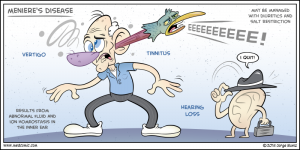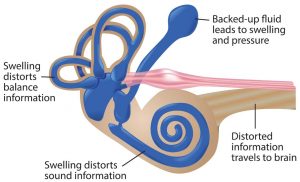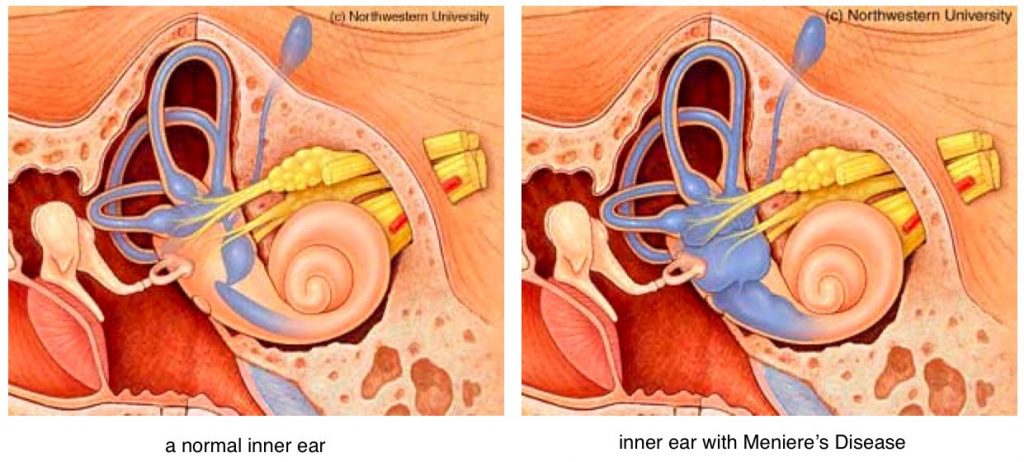Meniere’s Disease
What is Meniere’s disease?
It is a progressive disease of the inner ear that leads to attacks of vertigo (a sensation that one’s environment is spinning around them), fluctuating hearing loss, tinnitus (a sensation of ringing in the ears) and eventually a permanent hearing loss. The disease may affect one or both ears. It is accompanied by a range of other symptoms, however these may vary across individuals.
Who is affected by Meniere’s disease?
The age of onset is typically from 30-50 years, but has also been known to begin earlier. Males and females are equally likely to have the condition and it is more likely that an individual will have Meniere’s disease if they have a relative with it.
What other symptoms are involved?
The following are a list of common additional symptoms that may occur during or between attacks. Although, some individuals may be symptom free in between attacks.

- Nausea
- Ear fullness (a sensation of pressure or clogging of the ears)
- Loss of balance
- Headaches or migraines
- Anxiety
- Diarrhea
- Blurry vision
- Sweating
- Palpitations
- Change in appetite
- Fatigue following an attack
- Difficulty concentrating
How long do the attacks last for and how often do they occur?
This will vary with each person. Attacks may last from 20 minutes to an entire day. They can occur numerous times each week or they can be spread out by weeks or even years.
What causes Meniere’s disease?
Currently the exact cause is unknown, however there are a number of theories being investigated. The disease may be due to an autoimmune defect, viral infection, circulation deficits or genetic causes.

The symptoms are thought to be caused by excessive fluid and pressure build up in the inner ear. The inner ear houses the vestibular system (an important sensory system that gives our bodies information about balance) and the cochlear (a vital organ for hearing). Therefore, damage to the inner ear may result in balance difficulties in addition to hearing problems which is the case in Meniere’s disease.
How is it diagnosed?
A doctor will ask you questions about your medical history and questions about the symptoms you’re experiencing. Often a physical examination will be conducted in which the head and neck will be examined, including your ears.
A hearing assessment will be conducted by an audiologist. The results of the hearing assessment will assist in determining whether Meniere’s disease is causing the hearing loss. Additionally, the hearing assessment will help the audiologist guide you to select the best way to manage your hearing loss.
In some cases medical imaging, blood tests and balance tests are also necessary to diagnose the condition.
How is Meniere’s disease treated?
At the moment there is no cure but there are treatments that manage the symptoms or try to reduce the number of attacks. These treatments include medication, surgery, diet modification, devices to improve hearing or manage tinnitus and rehabilitation therapy.
What medications are available?
There are a range of medications available to manage symptoms. Some medications can be used during an attack to reduce the severity of vertigo or to control nausea.
Diuretics can be taken to decrease the body’s water retention which aims to reduce the quantity of fluid in the inner ear. This may reduce the severity and frequency of attacks.
Gentamicin is a medication that’s injected into the inner ear. It aims to reduce the frequency of vertigo attacks and functions by destroying part of the middle ear. It is only considered in severe cases.
How can modifying diet help manage Meniere’s disease?
Reducing sodium intake decreases the body’s water retention. Decreasing water retention can lead to reduced fluid in the inner ear which relieves inner ear pressure. Some people with Meniere’s disease find that modifying their diet helps them manage the condition.
What surgery options are available?
There are two types of surgeries available and they are generally used after more conservative treatment approaches have failed. One type aims to relieve pressure on the inner ear and the other servers the vestibular nerve so that information can not be sent from the vestibular system to the brain.

What does rehabilitation therapy involve?
Vestibular rehabilitation therapy is performed by a vestibular audiologist, specialist physiotherapist or specialist occupational therapist. It aims to improve balance and reduce dizziness through a range of exercises.
What options are available for managing hearing loss in Meniere’s disease?
The best option for you will depend on your individual circumstances along with the severity and nature of your hearing loss. Hearing aids and cochlear implants are the most commonly selected options for improving hearing for those with Meniere’s disease.
There are a range of hearing aids available and your audiologist will help you select the best device for you. Hearing aids function by amplifying sound waves. All hearing aids have four essential components: a microphone, an amplifier, a receiver and a battery source. The microphone detects sound which is then amplified and delivered to the ear by the receiver.
Cochlear implants (also known as bionic ears) are electrical devices surgically inserted into the inner ear. Users wear a small microphone behind their ear that converts sound waves into an electrical signal. The electrical signal is then transmitted to the implant within the ear which stimulates the auditory nerve allowing the user to hear. Cochlear implants may be suitable for those with bilateral (both ears) profound hearing loss due to Meniere’s disease.
How can the tinnitus be managed?
For information on managing tinnitus click here.
